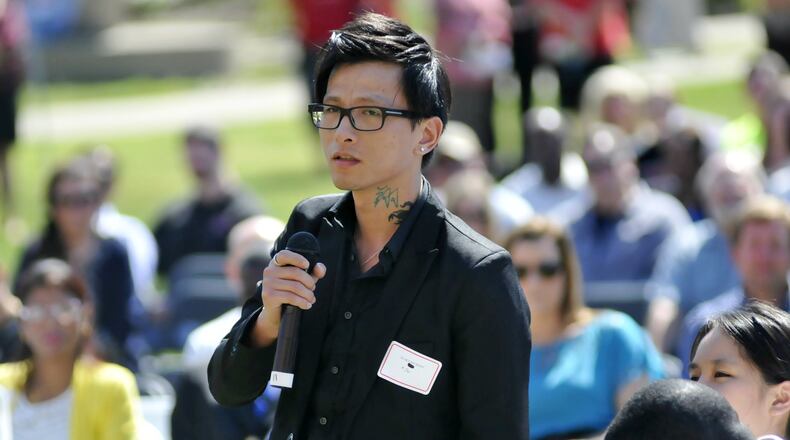Debate over whether illegal immigrants should be deported or granted a pathway toward citizenship is the “squeaky wheel” in the country’s debate on immigration, said John Forren, a political science professor at Miami University Hamilton.
“We spend a lot of time in public debates talking about controversy in immigration and disagreements that people have and what our policy is and how to deal with immigration issues,” he said.
But naturalization ceremonies — like the one that happened Thursday afternoon on the campus of Miami Hamilton — “is the other side of that argument that is so often ignored — that this is a country of immigrants,” Forren said.
Magistrate Judge Stephanie Bowman with the U.S. District Court of Southern Ohio delivered the oath of citizenship to 72 people that collectively renounced their citizenship from 39 countries.
“It’s a good day to be and a good day to become a United States citizen,” said Bowman. “America prospers for many reasons, one of the which is the strengthen that it is derived from its diverse population. As all of us here know, there’s great wisdom to be gained from the shared experiences of a diverse community and it is this link between and among us that enables your community and our country to grow and develop as a nation.”
While naturalization ceremonies are commonly held in the community, this is the first one believed to have occurred on Constitution Day, which is every Sept. 17. It was the first time it was held on Miami Hamilton’s campus, said Daniel Hall, Miami Hamilton professor of Justice and Community Studies
“They said no one has ever asked for this on Constitution Day and Citizenship Day,” he said. “The court was enthusiastic about it.”
Hall said there are discussions currently to see if the ceremony can happen again next year.
Before they took their oath of citizenship, Hamilton Mayor Pat Moeller told the six dozen soon-to-be Americans that this country is not just states united, "we are a people united."
“As I look into the crowd, I’m looking into a mirror,” Moeller said. “Unless you’re a Native American, all of our forefathers — yours and mine — came from somewhere else. The citizens of the United States are a united group of people with immigrant backgrounds.”
The mayor commended the new citizens for their “courage,” “faith” and “support of this great country” and called each one “heroes of democracy.” And as a hero of democracy, Moeller challenged them to be involved within their community, and vote in elections.
Becoming a citizen for 22-year-old Rosie Macedo was worth-while “journey” and glad the day she’ll never forget finally came. Citizenship, she said, affords her more benefits than being a legal immigrant. The Lakota West graduate and soon-to-be graduate of the University of Cincinnati, she said being a citizen is not only a personal goal but “will also serve as a benefit in the long run.”
The business economics and marketing student plans to be involved in the community by helping the youth.
“While I’ve been in college, and in high school, I’ve been tutoring inner city students, and I realize that they need the push, they need the motivation, they need help,” said Macedo. “Yes, they are in school but they also need hope, a lot of them don’t go to college because a lot of them don’t believe that they can and so obviously they need someone that can motivate them and instill that hope into them. So I can be that person.”
Macedo is not the first in her family to become a U.S. citizen. Her mother, Rose Richards, received her citizenship in 2012 and said her daughter’s citizenship gives her “piece of mind.”
“It’s peaceful, joyful and looking out to the future where she can help the country and all the kids,” she said.
Richards also feels the political debate on illegal immigration by some politicians is just “noise.”
“Some of them are making noise about building a fence and stopping people from coming here and then deporting people from the country who already here, struggling working with their family and kids, I don’t think it’s a good idea,” she said.
She thinks the focus should be on preventing new illegal immigrants rather than who is already in the United States illegally. And Richards is a part of the majority of 65 percent of Americans who support a pathway for citizenship.
“I think the government should find a way to give the people a paper to be able to pay taxes and develop the country … they’re already here,” she said. “What they should focus on is what are we going to do with people coming in.”
About the Author

